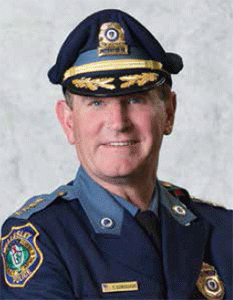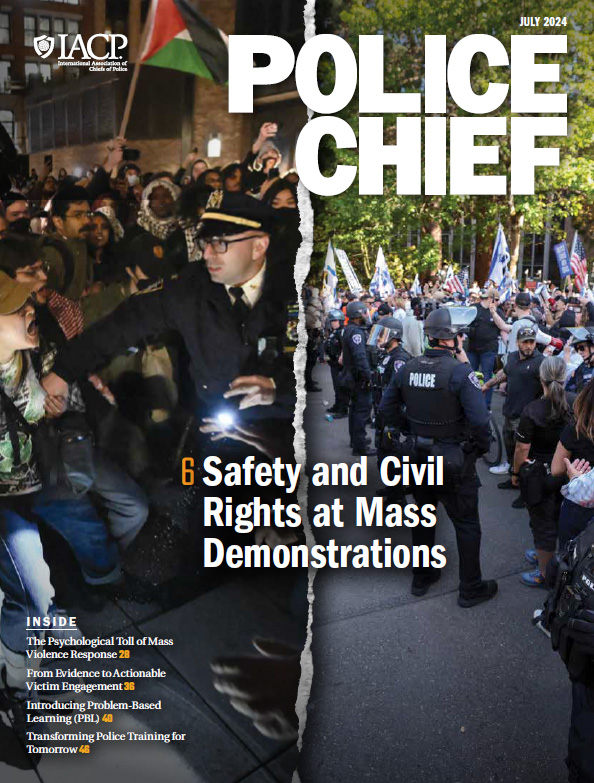 Policing is not just a job or a profession to me, but a calling and a vocation, as it is for many of you. In many ways, we serve as the foundations of our communities. Whether those communities are in the United States or in one of the 121 countries represented by IACP members, law enforcement officers are symbols of trust, honor, and integrity. We lead by example, and we lead by action. Our communities are safer, stronger, and better because of those who have dedicated their lives to the law enforcement profession.
Policing is not just a job or a profession to me, but a calling and a vocation, as it is for many of you. In many ways, we serve as the foundations of our communities. Whether those communities are in the United States or in one of the 121 countries represented by IACP members, law enforcement officers are symbols of trust, honor, and integrity. We lead by example, and we lead by action. Our communities are safer, stronger, and better because of those who have dedicated their lives to the law enforcement profession.
However, there are still a myriad of challenges that confront our communities. Over the last few years, we have collectively witnessed events many of us never thought we would see. We have witnessed horrific attacks by groups and individuals who have laid claim to one ideology or another. We have borne witness to senseless violence. After so many years spent working against the abuse of illegal drugs, we continue to witness the devastation of the opioid addiction epidemic.
Over the course of our professional careers, we have witnessed one social system after another fail to provide the most vital services to our communities, leaving those social issues on the doorstep of the police. Today, we are asking our officers and personnel to do more than what has ever been expected of any single government entity. We find ourselves in a very complex web of protecting lives, providing a myriad of social services, and intervening in one crisis after another. And, simultaneously, we have been confronted by what I consider the most disheartening phenomenon of all—watching so many of our communities question our trustworthiness, our commitment, and our legitimacy.
This should not be a surprise. This has been brewing for decades, if not centuries. What we are seeing is a culmination of a sense of unfairness, injustice, and loss of dignity that so many have experienced, not just at the hands of the police, but by a social system that has let so many down.
Most of us have dual leadership roles within our respective communities—we serve as the chief executive officer for our police agencies, and we are considered to be community leaders. I believe a true sign of leadership is our ability to recognize the status quo, possess the ability to create new and different pathways, and to achieve success in implementing those changes. The question I have for all of us is whether we have the desire to challenge the status quo and identify new ways to define policing. Do we have the insight to recognize that the principles and values on which we currently operate do not serve us well and, in fact, erode the standing we have in our communities? I believe in the bottom of my heart that we do.
Our communities are safer, stronger, and better because of those who have dedicated their lives to the law enforcement profession.
The IACP’s motto is “Serving the Leadership of Today, Developing the Leaders of Tomorrow.” The IACP is perfectly situated to be an agent of change. Only the IACP has the breadth and depth to lead an effort that will fundamentally rethink who we are, what we do, and how we operate. We will need to examine not just how we recruit, but who we recruit. We will need to consider the issues related to the concept of “police legitimacy” and identify the best approaches to put this concept into practice. We need to fully embrace evidence-based policing and best practices.
I also believe we must focus on the role of technology in policing. There is no doubt that technology can be a great asset to our officers, but there are times when it can also be a deadly distraction. Specifically, I’m talking about officers and troopers dying or being severely injured due to the distractions of technology in their vehicles. We need to demand a solution that allows officers to keep their head up while issuing verbal commands to run a query, change a radio frequency, or activate their emergency lights.
Finally, I believe that we must take the lead in addressing the number of sexual assault kits that are languishing in police evidence holding facilities and labs. While there are many reasons for this backlog, the simple fact is we have a responsibility to the thousands of victims, their families, and our communities to eliminate this backlog and allow justice to take its course.
I realize that the initiatives that I have outlined for you are not the work of a single year, but it is my belief that we can establish a pathway that will radically and fundamentally change what we understand policing to be.
In closing, I just want to say that I know that this has been a difficult year for law enforcement. However, I ask that you reflect about the fact that each of you have chosen to be a member of society’s most noble profession. You represent what is best about humanity.
Within our association is the best of the best in law enforcement: bold, innovative leaders who truly believe in the police service and are willing to take risks to improve the profession.
I’m proud to have the opportunity to lead the IACP, and I pledge to serve you with my complete devotion, honesty, and effort this year. ♦
Please cite as
Terrence M. Cunningham, “The Year Ahead,” President’s Message, The Police Chief 82 (November 2015): 6.


